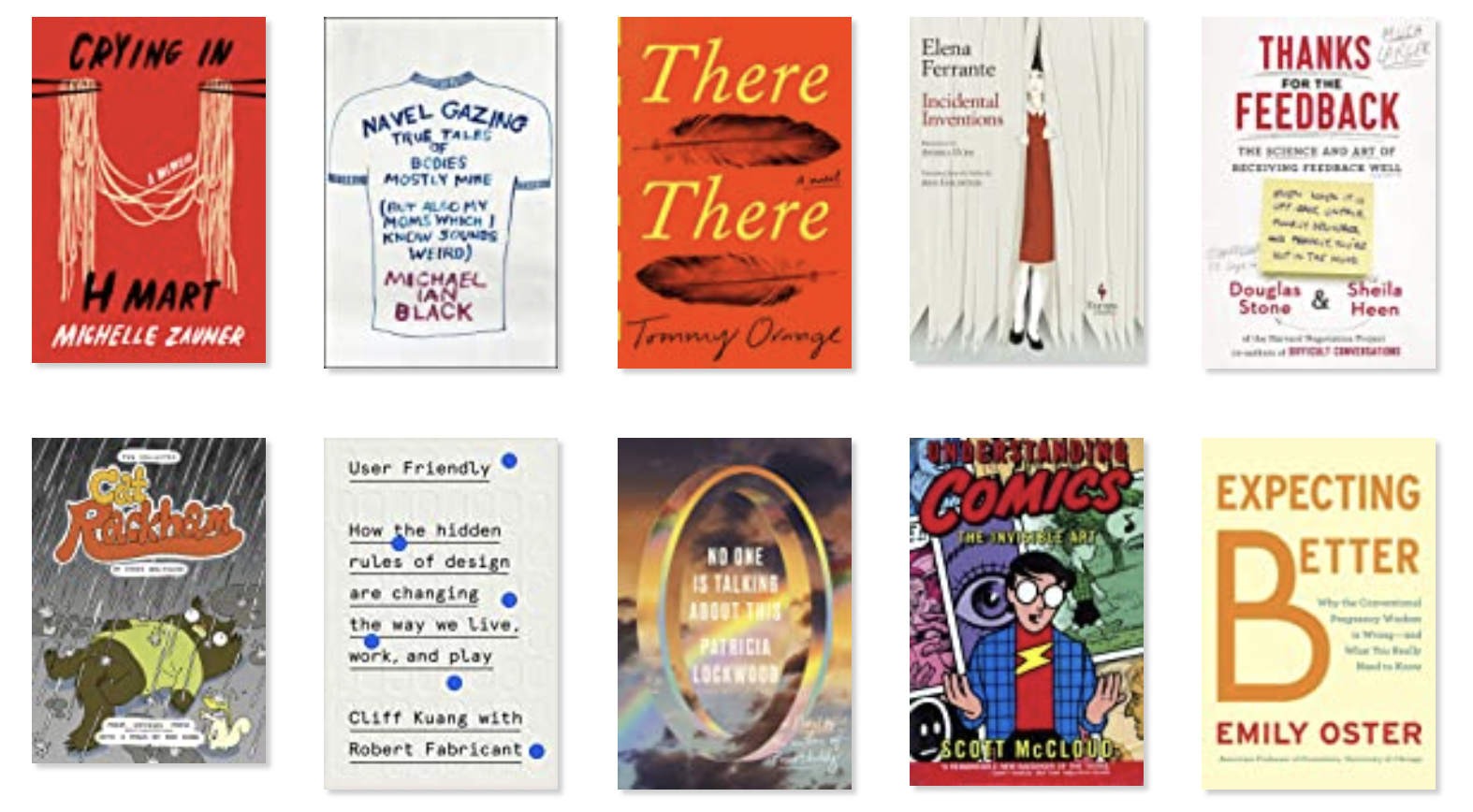I realized how little I was reading and was in danger of not making my reading challenge so I upped my reading (aka shorter books) in December to make it across the finish line.
Happy new year folks!

Fiction
There There by Tommy Orange
Why I picked up this book: I’ve seen this book all over good reads
Mood: if you like books that follow around different narrative perspectives
I really liked the story and the writing. I liked that it brought perspective to urban Native American life and it was as plus it was based in Oakland and I recognized some of the place names.

Cat Rackham by Steve Wolfhard
Why I picked up this book: I was at the library and felt likeI needed to leave with more books
Mood: anxiety
I was drawn to the illustration style and also the cats. It wasn’t what I expected. I thought it would be more like Sarah Andersen’s comics that deal with anxiety in a humorous way. This was much darker than I expect. Apparently he had a big like Live journal following in the day. Wolfhard was one of the storyboard artists for Adventure Time.
Non-fiction

Thanks for the Feedback: The Science and Art of Receiving Feedback Well by Sheila Heen and Douglas Stone
Why I picked up this book: I randomly searched books about feedback after wanting to know how to handle it better and seeing this one
Mood: Better in life, work, and relationships
I had low expectations for this book but I really liked it! I recommend it to everyone. It was so helpful and specific I took time to take notes while I was listening to the audiobook. As in: I was basically treating it like it was a class. I expected it to be helpful for work, but they talk about all the ways we get feedback in our lives and how we respond to that in different ways that can be harmful (or at least less productive). It made me think about all of my interactions in family & relationships more so than work. Honestly, I think I had low expectations because the cover is really cheesy, but I realized while reading (because they literally mentioned it) it they also wrote Difficult Conversations, which people have also recommended. I will probably write more about this book later.
My one criticism was that maybe they had too many examples, but that probably actually helps learning the concepts more fully and I’m just impatient.

Incidental Inventions by Elena Ferrante
Why I picked up this book: I’ve liked her My Brilliant Friend series and saw my friend had just finished reading it
Mood: If you liked those books and want to learn more about the author.
The premise is that she challenged herself to write a weekly column for a newspaper for a year and this is the collection of all her those column posts. She talks about her life, views, and most of all what writing means to her. I liked it, but I personally like her fiction better.

User Friendly: How the Hidden Rules of Design Are Changing the Way We Live, Work, and Play by Cliff Kuang and Robert Frabricant
Why I picked up this book: I was trying to find a book to assign for a design class I’m teaching and my friend referenced this book in a book she wrote (!)
Mood: If you want to know how cool design is even though you never intend to be a designer
I was pleasantly surprised and wished I could get more non-designers to read books like this. It’s funny that this book would be most impactful if non-designers read, but it’s the kind of book that only designers would pick out.
I think I’m pretty used to books with big promises not really living up to it. Ok, I’m not totally sure what this book is promising to do, but it was well-written and had a lot of real examples I’d never heard of, or when deeper into the in the examples I have heard of. I found myself googling alongside it. It’s a dang shame that I can’t get people to understand how much design impacts our lives.

Understanding Comics: The Invisible Art by Scott McCloud
Why I picked up this book: re-reading this book that I had read before in college
Mood: You want someone to break down visual design concepts in a fun graphic novel format
First of all, if you haven’t ever read a graphic novel, you should! But if you are feeling biased against them because they don’t seem science-y enough for you (but like, who are you to think that?), maybe you could start with this book because it explains all the work comics have to do as an art form to work. Like all the work involved in making a movie “work.” I would like all things explained to me in graphic novel form.

No One Is Talking About This by Patricia Lockwood
Why I picked up this book: My coworkers were talking about how much they liked her (possibly after sharing a tweet) and I looked up a book to try
Mood: Frantic energy
It’s a blend of describing the present day as if it’s science fiction and her own personal struggles. You follow her through the ups and downs of her thoughts. It felt unique.

Expecting Better by Emily Oster
Why I picked up this book: I heard Emily Oster talk about this book a year or so ago on one of my economics podcasts and thought it sounded like a helpful book
Mood: Babies but make it economics
The premise is going through all the lore of pregnancy though an academic lens to separate the myths from what’s actually been studied. Not to give advice, but just present the information and risks so that you can make decisions yourself.

Navel Gazing: True Tales of Bodies, Mostly Mine by Michael Ian Black
Why I picked up this book: In high school I really liked his commentary on the VH1 (¯\_(?)_/¯) and had his book on my Goodreads list for like 10 years and randomly saw this book was available when I was look for a non-sad book to read
Mood: comedic memoir
In part of the book the author jokes about the surprise success of his book and how it makes it to #3 NYT best seller under David Sedaris and another author. I guess I would say that I agree it’s under David Sedaris. It was funny but didn’t feel particularly special to me.

Crying in H Mart by Michelle Zauner
Why I picked up this book: I feel like I’ve seen this on all the lists and I actually have been to an H Mart while in LA
Mood: Identity, mother-daughter relationships, and loss
The book is mostly about the relationship between the author and her Korean mother and a shifting relationship to her mixed race identity. I think anyone could read and enjoy it though, I read about white people all the dang time and it’s helped me to see that they too are people who have feelings and struggles.
lolz
There was a part towards the end particularly got me. I think if the author hadn’t done such a good job showing and not telling you what their relationship was like.

